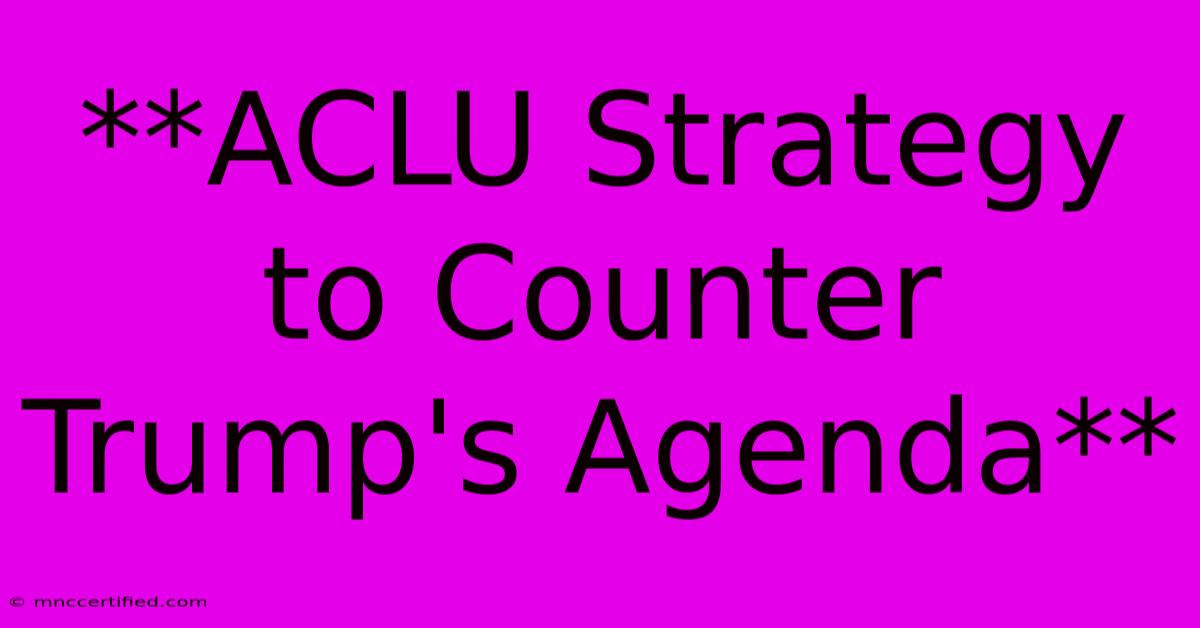**ACLU Strategy To Counter Trump's Agenda**

Table of Contents
ACLU's Strategy to Counter Trump's Agenda: Fighting for Civil Liberties in a Time of Turmoil
The American Civil Liberties Union (ACLU) has a long history of defending civil liberties and protecting the rights of all Americans. During the Trump administration, the ACLU faced a formidable challenge as the president pursued policies that directly threatened fundamental freedoms. This article explores the ACLU's strategic approach to counter Trump's agenda, highlighting their key initiatives and the impact of their actions.
A Multifaceted Approach to Defense
The ACLU recognized that Trump's policies required a multifaceted approach. They employed a combination of legal challenges, public advocacy, and grassroots organizing to defend civil liberties and push back against the administration's agenda.
1. Legal Challenges:
-
Lawsuits: The ACLU spearheaded numerous lawsuits challenging Trump administration policies, including the Muslim travel ban, the separation of families at the border, and the administration's attempts to roll back environmental protections. These legal challenges often reached the Supreme Court, playing a crucial role in shaping the legal landscape.
-
** Amicus Briefs:** The ACLU filed numerous amicus briefs, supporting parties in cases related to civil liberties, further amplifying their legal voice and influencing the outcome of critical cases.
2. Public Advocacy:
-
Public Statements and Reports: The ACLU issued press releases, statements, and reports that condemned discriminatory policies and highlighted the human rights implications of Trump's actions. These public pronouncements aimed to raise awareness and galvanize public support for civil liberties.
-
Media Engagement: The ACLU actively engaged with the media, providing expert commentary, analysis, and interviews to raise public awareness about the administration's attacks on civil liberties.
3. Grassroots Organizing:
-
Mobilizing Supporters: The ACLU mobilized their vast network of supporters across the country, organizing protests, rallies, and campaigns to highlight the importance of civil liberties and demand accountability from the government.
-
Engaging Communities: The ACLU focused on engaging with local communities, particularly marginalized groups, to provide legal aid, advocacy, and support. This grassroots organizing helped build a strong base of support for their work and ensured that their efforts were grounded in the lived experiences of those most impacted by the administration's policies.
Key Wins and Impacts
The ACLU's unwavering commitment to civil liberties yielded significant results throughout the Trump administration. They successfully challenged several controversial policies in court, including:
- The Muslim Travel Ban: The ACLU's lawsuit ultimately resulted in the Supreme Court upholding a version of the ban, but the court's decision narrowed its scope, demonstrating the effectiveness of legal challenges in shaping policy outcomes.
- Family Separation at the Border: The ACLU's legal challenges and public advocacy significantly contributed to the termination of this inhumane policy.
- Environmental Protections: The ACLU successfully challenged the Trump administration's efforts to weaken environmental regulations, protecting vital environmental safeguards.
Lessons Learned and Future Challenges
The ACLU's experiences during the Trump era highlight the importance of unwavering dedication to defending civil liberties, even in the face of immense political pressure. Their multi-faceted approach served as a model for effective resistance, demonstrating the power of legal challenges, public advocacy, and grassroots organizing.
However, the fight for civil liberties continues. The ACLU remains vigilant in protecting individual rights and freedoms in the face of ongoing challenges. Their ongoing efforts focus on addressing issues such as:
- Voter Suppression: The ACLU actively combats attempts to restrict voting rights and ensure fair and accessible elections for all.
- Immigration Policies: The ACLU advocates for humane and just immigration policies, challenging discriminatory practices and protecting the rights of immigrants.
- Racial Justice: The ACLU works to address systemic racism and ensure equal justice for all, fighting against police brutality, mass incarceration, and other forms of racial discrimination.
Conclusion
The ACLU's strategy to counter Trump's agenda exemplifies the vital role of civil liberties organizations in a democracy. They demonstrate that relentless advocacy, legal challenges, and grassroots mobilization are crucial in safeguarding fundamental rights and holding government accountable. By understanding the ACLU's tactics and their ongoing work, individuals can become more informed and engaged citizens, contributing to the protection of civil liberties for generations to come.

Thank you for visiting our website wich cover about **ACLU Strategy To Counter Trump's Agenda**. We hope the information provided has been useful to you. Feel free to contact us if you have any questions or need further assistance. See you next time and dont miss to bookmark.
Featured Posts
-
What Does A Car Insurance Card Look Like
Nov 08, 2024
-
Robins Out Coventry Citys Managerial Change
Nov 08, 2024
-
Osimhen Inspired Napoli Defeats 10 Man Tottenham
Nov 08, 2024
-
Does Car Insurance Cover Leaking Sunroof
Nov 08, 2024
-
Chelsea Line Up Noah Fixture
Nov 08, 2024